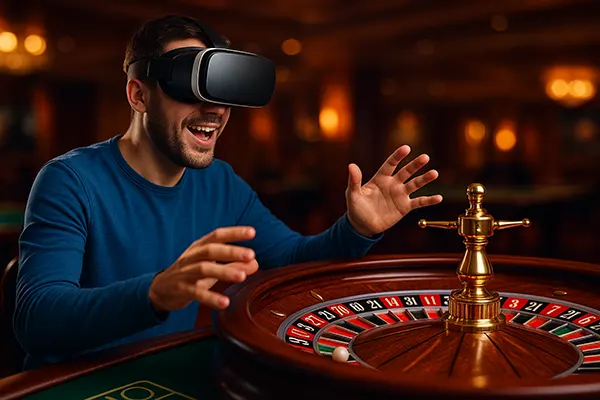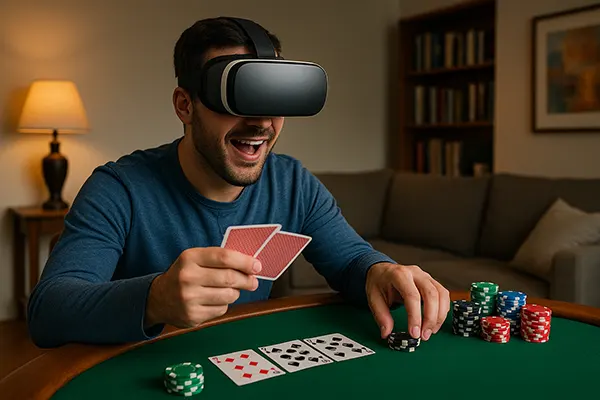The Impact of VR Roulette on Player Engagement

Virtual Reality (VR) has moved from being an experimental technology to a transformative tool reshaping digital entertainment. Among all VR applications, roulette has taken a prominent place, offering players not just visual immersion but an authentic sense of presence. As of 2025, VR roulette has become one of the most dynamic trends in the online gaming industry, influencing how players interact, engage, and perceive the gaming experience.
Technological Innovation Behind VR Roulette
The success of VR roulette lies in its seamless integration of advanced technology. Modern VR headsets, enhanced graphics engines, and real-time physics simulation allow players to experience a realistic environment with smooth motion and lifelike interaction. Developers are now incorporating haptic feedback and 3D audio, which elevate the realism of every spin of the wheel.
Another major advancement is the introduction of multiplayer VR lobbies. These spaces simulate authentic casino halls, where players can communicate through gestures and voice chat. Such innovations replicate social interaction, bridging the gap between physical and digital experiences. This direct engagement has proven to increase average session duration and player satisfaction rates.
Artificial Intelligence (AI) also plays a significant role in refining VR roulette. AI-driven croupiers, for instance, add a human-like dynamic to the game, responding naturally to player actions and maintaining a smooth rhythm. This fusion of realism and technology contributes to building emotional connections with the experience, fostering long-term engagement.
How Technology Shapes Player Retention
Player retention in VR roulette is directly linked to technological stability and sensory depth. When visual and physical realism combine with responsive game design, users tend to return regularly. Smooth motion tracking, lag-free operation, and natural avatar gestures ensure a continuous sense of immersion that encourages repeated sessions.
Additionally, the continuous upgrades in VR hardware and network bandwidth have reduced latency, which was once a major barrier to adoption. Today’s systems support 120Hz refresh rates and ultra-low latency, making VR roulette smoother than ever. These improvements create a sense of trust and reliability, essential for sustained player engagement.
From a psychological perspective, the tangible realism of VR roulette enhances dopamine response linked to anticipation and reward. This subtle emotional reinforcement keeps players motivated without the need for intrusive gamification tactics or exaggerated bonuses.
Social Interaction and Psychological Engagement
Social factors are among the strongest motivators in VR roulette participation. Players are naturally drawn to shared experiences, and the VR environment amplifies this through real-time presence. Avatars can mimic facial expressions, movements, and even posture, which makes every interaction more personal and engaging.
Studies conducted between 2023 and 2025 indicate that social VR games demonstrate a 40% higher retention rate compared to single-player formats. Roulette, being inherently communal, thrives in such spaces. Whether chatting around the table or celebrating a win, these interactions strengthen user connection and emotional investment in the game.
Moreover, VR roulette fosters a sense of belonging within digital communities. Casinos often host live tournaments, social events, and themed nights within VR lobbies. These initiatives encourage users to log in more frequently, participate actively, and associate their entertainment with a trusted virtual environment.
Community Building and Trust
Building trust in a virtual environment requires authenticity and transparency. In VR roulette, fairness is maintained through certified random number generators (RNGs) and blockchain-based verification systems. These technologies ensure that every spin is verifiable, which increases player confidence in the results.
Casinos adopting VR technology also implement responsible gaming tools such as session timers and self-exclusion features visible within the 3D space. This proactive approach strengthens user trust and aligns with modern regulatory expectations.
Community forums and cross-platform chat integration allow users to share experiences and feedback, creating a loop of engagement and improvement. When players feel heard and valued, they are far more likely to remain loyal and active participants.

Future Trends and Industry Adaptation
Looking ahead, the trajectory of VR roulette points toward hybrid experiences combining augmented reality (AR) and virtual reality (VR). In 2025, many gaming studios are experimenting with mixed-reality roulette tables that project digital elements into physical environments, offering players flexible ways to play from home or in dedicated VR lounges.
Regulatory bodies across Europe are also adapting to these developments. The European Gaming and Betting Association (EGBA) is currently outlining specific guidelines for VR-based gambling environments, focusing on data protection, user safety, and fair play standards. This legal clarity will likely accelerate the adoption of VR roulette across licensed operators.
Economically, VR roulette presents significant growth potential. Market analysis from 2025 estimates that VR gaming revenues have surpassed £3.2 billion, with roulette accounting for nearly 15% of that segment. As technology becomes more accessible, these figures are projected to increase steadily over the next decade.
Integrating Innovation with Responsibility
While innovation drives engagement, responsible integration ensures long-term sustainability. Developers and operators must balance immersive excitement with ethical gaming practices. VR technology allows the implementation of awareness reminders and voluntary cooling-off periods directly inside the virtual environment.
Transparency in game mechanics and clear communication of odds should remain top priorities. In 2025, reputable VR casinos are setting new benchmarks in compliance by displaying live payout percentages and RNG certifications within their virtual interfaces.
Ultimately, VR roulette represents not only a technological milestone but also a shift in how players connect emotionally and socially with gaming. The combination of realism, interaction, and trust transforms roulette from a simple betting game into a multifaceted, immersive experience that continues to redefine player engagement worldwide.




